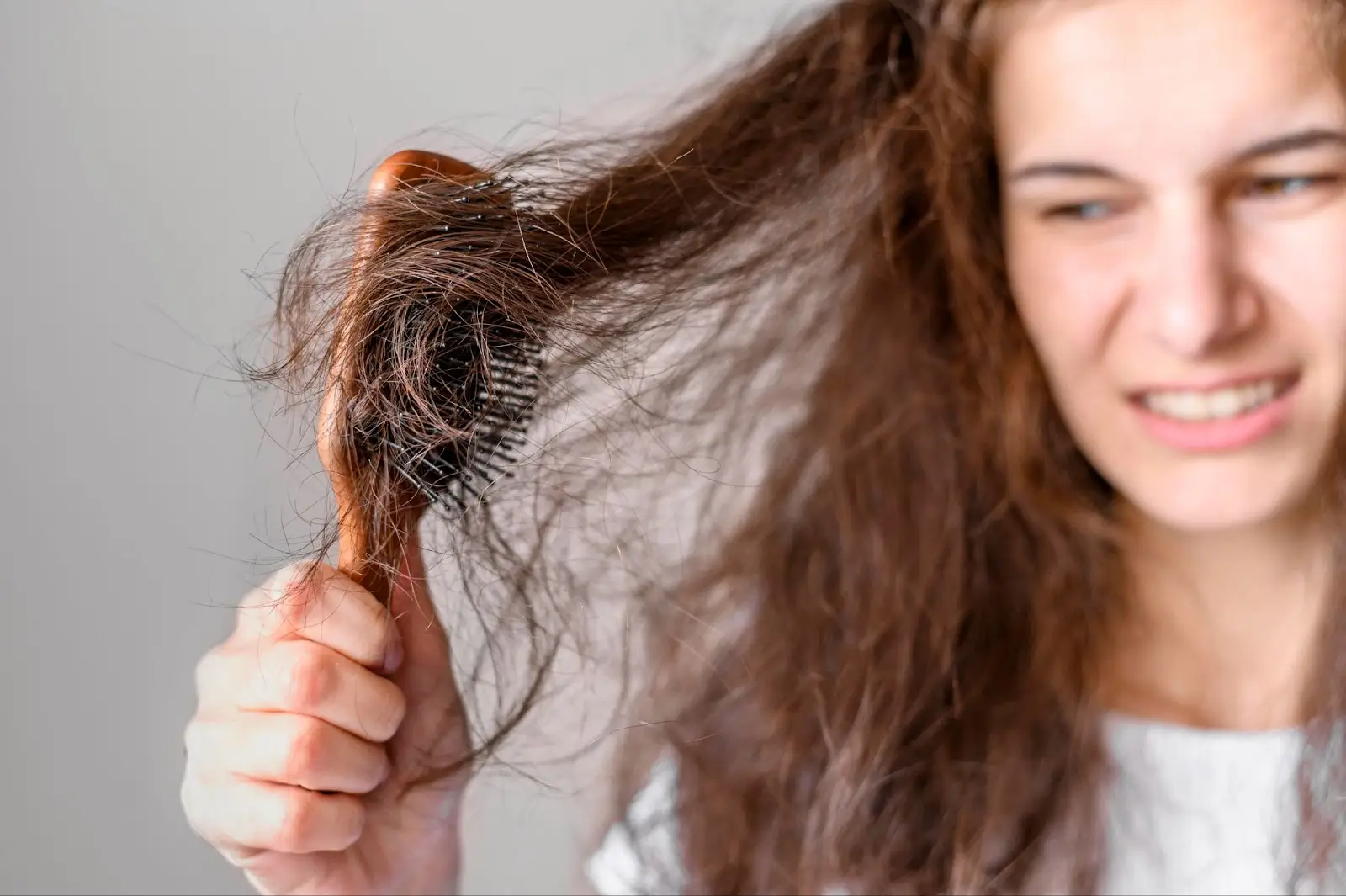Only for Licensed Professionals
Only for Licensed Professionals
.webp)
Does Evenity Cause Hair Loss?
David Fuller
Last Updated On: June 30, 2025
Hair loss is a common concern, affecting approximately 80 million individuals in the United States alone. Its causes are varied, from genetic factors and hormonal imbalances to side effects from certain medications. For those undergoing treatments for other health conditions, unexpected hair thinning can lead to distress and uncertainty.
Evenity (romosozumab), a medication designed to treat osteoporosis in postmenopausal women at high fracture risk, has sparked some concern among patients regarding potential side effects, including hair loss. While Evenity’s primary function is to increase bone density, the possibility of it influencing hair growth has raised questions that warrant careful examination.
In this article, we will delve into clinical findings, patient experiences, and expert opinions to assess whether Evenity is linked to hair loss and what users should know about its potential impact on hair health.
Key Takeaways
- Current clinical data do not support a direct connection between Evenity and hair loss. However, practitioners should still address patient concerns thoughtfully and with care.
- Hair shedding during Evenity treatment may be coincidental and linked to factors like stress, nutritional deficiencies, or hormonal changes, rather than the medication itself.
- A thorough evaluation, including lab tests and history-taking, is crucial to identify potential causes of hair loss, such as telogen effluvium, and to rule out other underlying issues.
- Clinicians should provide clear information on preventive care and hair health, offering hydration, nutrition, and stress management tips to help patients manage any hair changes.
- In cases of persistent hair thinning, involving specialists like dermatologists and endocrinologists can ensure a comprehensive care plan and identify any other potential causes of hair loss.
- Tracking progress through regular assessments and offering shared decision-making for treatment adjustments can help manage patient expectations and maintain their overall well-being throughout the therapy.
About: Operating since 2016, Med Supply Solutions is known for being one of the industry’s top and trusted suppliers of cosmetic and viscosupplementation products. If you’re looking to buy Evenity online, contact our sales department for more information.

Evenity and Hair Loss – Is It a Documented Side Effect?

Evenity’s clinical data has been extensively reviewed in regulatory trials, with no direct evidence linking it to hair loss. The most commonly reported side effects include joint pain, headaches, fatigue, and local injection site reactions. More serious but rare events include cardiovascular complications and hypocalcemia.
Despite the absence of hair loss in official side effect listings, some patients have raised concerns in post-market discussions. Online forums and anecdotal reports occasionally mention hair shedding during Evenity therapy. However, these are isolated instances and lack the scientific rigor to establish a causal relationship.
Clinicians who encounter patients with hair thinning during Evenity use should explore other potential underlying causes. A thorough medical history, nutritional assessment, and laboratory workup can help identify contributors such as iron deficiency or thyroid imbalance.
It’s important to reassure patients that no formal data supports a link between Evenity and hair loss while continuing to monitor and manage their overall treatment progress.
Post-Market Experience with Evenity and Hair Thinning Reports
Although clinical trials for Evenity involved thousands of participants, hair loss was not listed among the observed or reported side effects. However, some users have shared personal accounts of hair thinning during or shortly after treatment. While such reports exist, there is no direct scientific evidence that can link Evenity to hair loss.
A few mention scalp tenderness, increased shedding, or general fatigue, but these are often intertwined with other symptoms, such as rashes or stress-related conditions. Without consistent patterns or controlled comparisons, these observations remain speculative and do not represent verified safety signals.
Given this context, healthcare providers should remain attentive to patient concerns without overstating risks. When patients report hair shedding, clinicians should conduct a comprehensive assessment—including laboratory work and a review of medications—to rule out nutritional, hormonal, or autoimmune factors. Contextualizing hair changes within this broader diagnostic lens ensures comprehensive care.
Indirect Causes of Hair Loss During Evenity Treatment

Hair loss is a distressing symptom for many patients, especially when it emerges during essential treatments like osteoporosis therapy. While hair loss is a frequently searched concern, the scientific evidence does not support a direct link between romosozumab and alopecia. Still, patients may report increased hair shedding, and it’s essential to investigate the possible indirect causes contributing to this experience.
Here are common contributors that may coincide with hair loss during Evenity therapy:
- Stress or Illness: Major health events, surgery, or emotional distress can trigger telogen effluvium, a form of temporary hair loss. The timing of starting Evenity might overlap with such stressors, leading patients to misattribute the symptom.
- Nutritional Gaps: Deficiencies in key nutrients—especially iron, zinc, protein, and vitamin D—are common in older adults. Evenity may increase bone remodeling demands, sometimes exposing pre-existing deficiencies that affect hair and nail strength.
- Hormonal Fluctuations: Postmenopausal women, the primary recipients of Evenity, often experience estrogen decline that alters hair density and growth cycles. These hormonal shifts may occur independently or alongside treatment.
- Concurrent Medications: Drugs like corticosteroids, chemotherapeutics, SSRIs, or thyroid medication may contribute to hair shedding. A complete medication reconciliation is essential to identify other potential culprits.
As reflected in many Evenity reviews, patients are understandably concerned when they notice changes in hair texture or volume. However, clinicians should reassure them that no biochemical pathway has been found that links romosozumab to direct follicular disruption. Proactive education and support can help manage expectations and improve treatment adherence.
Clinical Approach: Managing Hair Loss Concerns in Evenity Patients
While current data do not support a direct link between Evenity and hair loss, patient-reported concerns deserve a thoughtful, evidence-based response. Hair shedding during osteoporosis treatment can be distressing, whether coincidental or related to physiological stress. A proactive clinical approach helps address these concerns, strengthens trust, and ensures that both bone health and overall well-being are carefully balanced.
Evaluate Holistically
Start with a comprehensive workup to rule out common causes of hair loss. Order lab tests such as CBC, ferritin, TSH, vitamin D, and iron studies. Review the patient’s medication list for agents linked to alopecia. Consider age, hormonal status, diet, and recent illness, especially if telogen effluvium is suspected post-treatment initiation.
Timeline Correlation Matters
Hair shedding that begins within 1–2 months of starting Evenity may indicate telogen effluvium, a temporary condition triggered by physiological stress. However, correlation does not equal causation. Detailed history-taking, including emotional stress, dietary changes, or surgeries, is crucial for contextualizing the timing of hair loss after Evenity administration.
Communicate Clearly
Educate patients on preventive care, including good scalp hygiene, balanced nutrition, and stress reduction strategies. Clear communication about managing expectations and explaining the potential causes of hair loss helps reduce anxiety and ensures a supportive treatment environment.
Offer Reassurance and Preventive Tips
Recommend hydration, protein-rich meals, iron-rich foods, and supplements if deficiencies are present. Gentle hair care routines—like avoiding harsh treatments or heat styling—can prevent further damage. In some cases, biotin or topical treatments may provide mild support. Emphasize that many hair loss cases are self-limiting and reversible.
Coordinate Care
When needed, refer to dermatologists for scalp assessment or endocrinologists if a hormonal imbalance is suspected. Gastroenterology may be involved in addressing malabsorption concerns, particularly in patients with chronic gastrointestinal issues. A multidisciplinary approach ensures other potential causes aren’t missed and helps sustain trust during osteoporosis treatment.
Track Hair Progress
Use clinical photos every 4–6 weeks or hair shedding scales (like counting strands on wash days) to measure progress. Noting a greater than 30% increase in shedding may warrant closer evaluation. This also creates a visual record to support shared decisions on whether to adjust therapy.
Adjust Treatment Cautiously
If hair loss persists and becomes distressing, weigh the pros and cons of continuing Evenity. In rare cases, a treatment pause may be appropriate through a shared decision-making process. For patients still requiring anti-osteoporotic support, transition planning (e.g., to Prolia or bisphosphonates) may be explored, especially during discussions about Evenity vs. Prolia.
Conclusion
While evenity dosing carries many known side effects, hair loss is not recognized as a direct adverse effect. Nonetheless, patient concerns deserve validation and evaluation. By ruling out other causes, providing education, and implementing careful monitoring, clinicians can support symptomatic patients without compromising essential osteoporosis therapy. Ongoing real-world surveillance will continue to clarify rare or unexpected outcomes, but current evidence suggests that hair loss during Evenity use is likely coincidental rather than causally related.
FAQs
1. Can Evenity cause hair loss?
Clinical trials did not report hair loss. While anecdotal cases exist, no causal link has been established.
2. Should I stop Evenity if I’m experiencing hair loss?
Not necessarily. Evaluate other causes first. If hair loss is severe and well-timed, discuss the risks and alternatives, such as Prolia.
3. How to manage hair thinning during Evenity treatment?
Check labs, evaluate medical history, encourage nutritional support, and consider scalp-directed therapies or dermatology referral.
4. Will hair regrow after stopping Evenity?
Yes, if shedding is due to telogen effluvium, hair typically regrows within 6–12 months after the trigger is resolved.
References
Hair loss. Cleveland Clinic. https://my.clevelandclinic.org/health/diseases/21753-hair-loss
Could Evenity cause Hair loss? – a phase IV clinical study. https://www.ehealthme.com/ds/evenity/hair-loss/
Ghoshal M. Side effects of evenity: What you need to know. Healthline. Published November 18, 2024. https://www.healthline.com/health/drugs/evenity-side-effects
Products
Cart
Log In
Newsletter
Subscribe for exclusive offers and updates on new arrivals
Share feedback at:
Working Hours
MON - SUN 9AM to 6PM EST
The Most Popular Brands
Med Supply Solutions
Support
Secure checkout is guaranteed with full adherence to PCI DSS payment standards.
Products listed here are guaranteed authentic and manufacturer-sourced.
Pay easily with trusted providers


*Google and Apple Pay are currently only available via a direct link provided by your account manager.
Copyright 2026. Med Supply Solutions